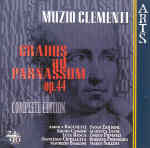The 100 studies encompassing Clementi’s Gradus ad Parnassum address nearly every aspect of piano technique in the B.C. era (that’s “before Chopin!”). While a didactic purpose is built into each composition’s fabric, Clementi’s harmonic inventiveness and natural affinity for idiomatic keyboard writing certainly will hold your attention, providing that you listen to these pieces in small groups.
For this complete recording it seems fitting that Arts Music should distribute the labor among nine young, talented, and upcoming Italian pianists, plus an older ringer, Bruno Canino. He and pianist Luca Rasca particularly stand out for their light, fluent dispatch of the more taxing double-note exercises between pieces 11 and 30. Maurizio Baglini also is quite wonderful. He commands a wide array of fortepiano-like colors and articulations that positively tickle the ear in Exercises 45 through 48.
The lively, close-up engineering sometimes exaggerates pedal noises, but not obtrusively so, and the annotations are informative if a bit long-winded for what they have to say. All told, this is genuine manna for piano etude addicts. [11/7/2003]
































